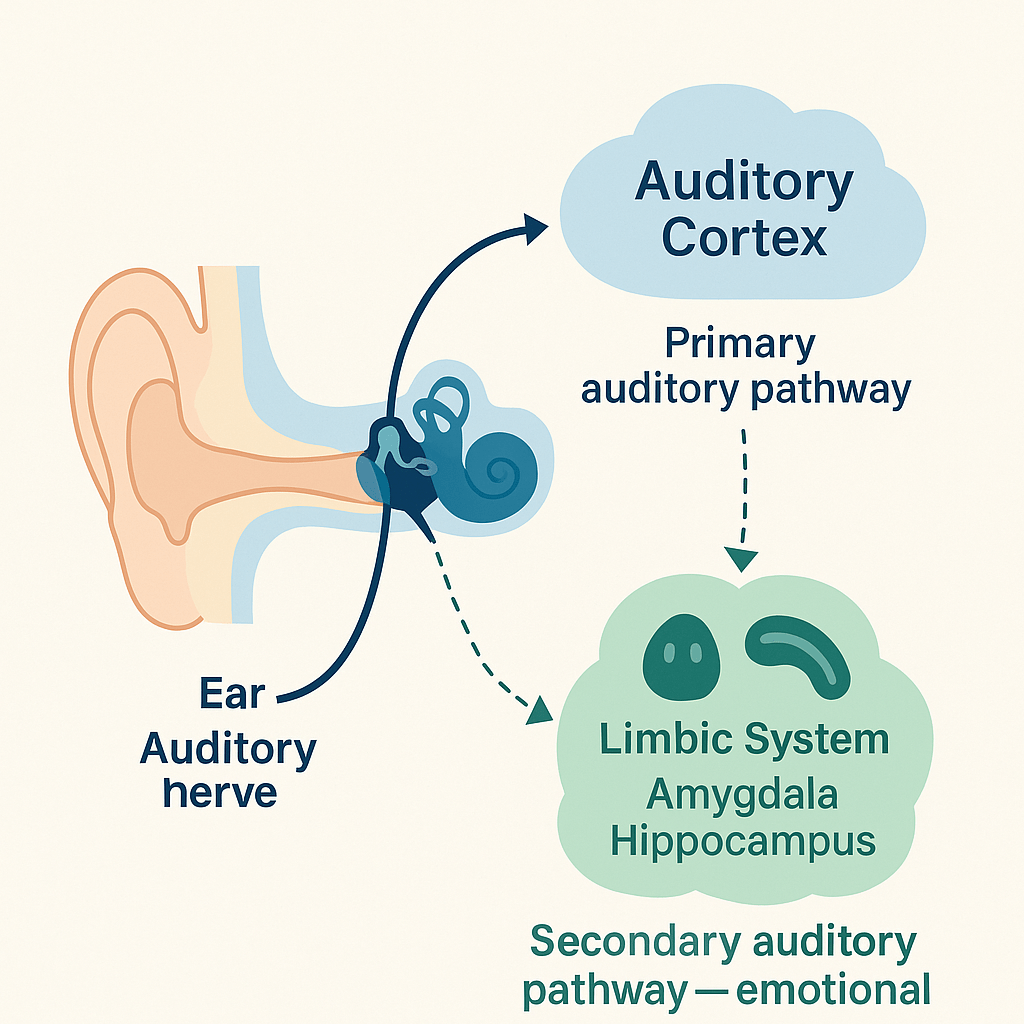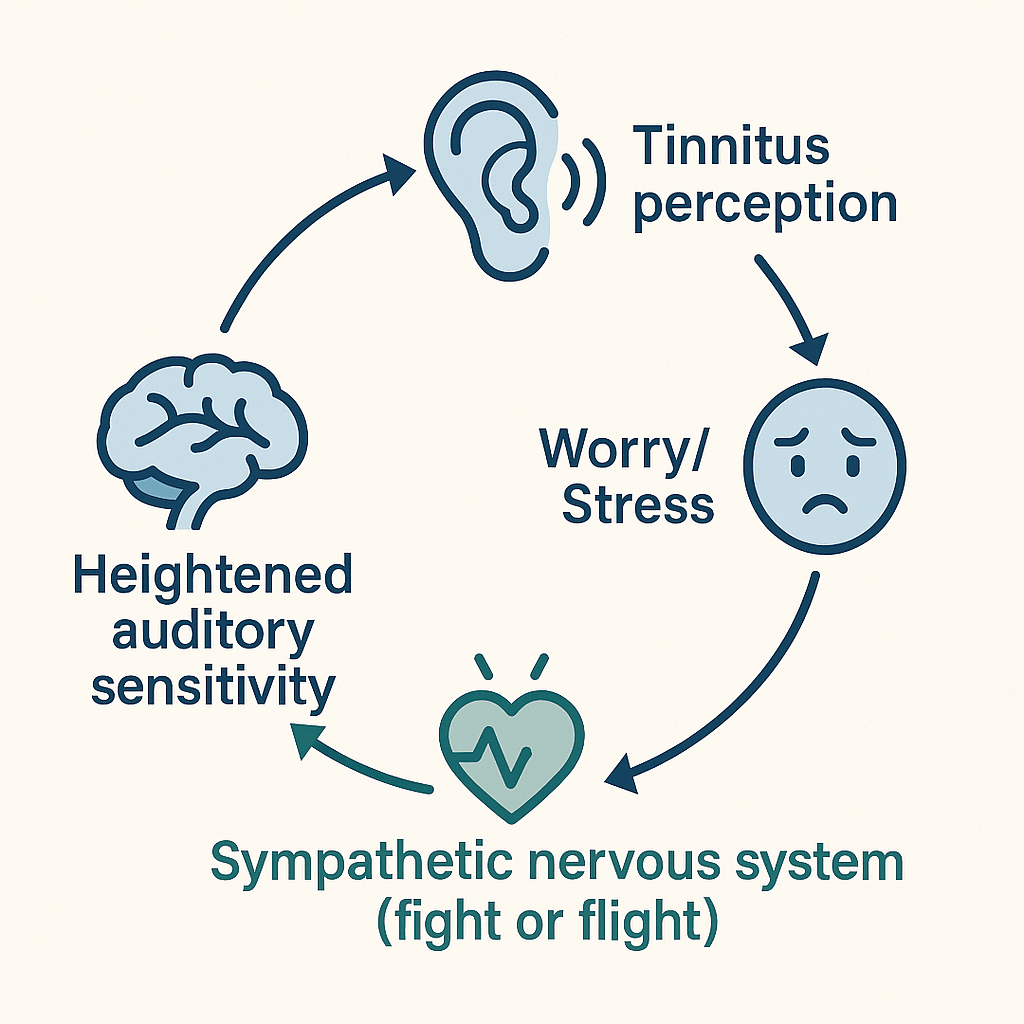If you’ve ever noticed a faint ringing, buzzing, or hissing in your ears when the room is quiet, you’re not alone. For many people, tinnitus is occasional and fades into the background. But for some, it’s persistent and can feel as though it takes over daily life. Sleep can become elusive, concentration more difficult, and stress levels climb as the sound seems to grow louder the more you notice it.
That experience isn’t imagined — and it isn’t just about your ears. While tinnitus begins with changes in the auditory system, the way the brain reacts to the sound can shape how intense and bothersome it feels. Understanding that reaction is key to understanding why mindfulness, a mental skill that can be learned and practiced, can make such a difference.
The Path From Ear to Brain

Sound normally travels along what’s known as the primary auditory pathway: from the ear and auditory nerve, through the brainstem, and up to the auditory cortex where sound is recognized and interpreted. But there’s a second, parallel route: the secondary auditory pathway. This pathway is less talked about, but it links sound perception to the brain’s emotional and threat detection centers — the limbic system, home to structures like the amygdala and hippocampus (Rauschecker et al., 2010).
When a sound is new or unexpected, the limbic system can tag it as important or even threatening. That’s helpful if you’re alone on a dark street and hear footsteps behind you; it’s less helpful when the “sound” is just your own tinnitus. Once the amygdala lights up, the body’s fight-or-flight response can follow. Heartrate rises, muscles tense, attention zeroes in on the sound, and stress hormones prime you to keep listening for danger. Over time, that reaction can make tinnitus seem louder and harder to ignore (Jastreboff & Jastreboff, 2015).
Stress and the Tinnitus Loop

The relationship between tinnitus and stress can become circular. The initial noise triggers worry: Is something wrong? Will this ever stop? Those anxious thoughts fuel the body’s stress response. In turn, stress heightens the sensitivity of the auditory system and keeps the limbic system on alert, so the ringing feels stronger. The more distress you feel, the more your brain pays attention, and the more prominent your tinnitus will feel. It’s a vicious cycle — but it can be managed. Breaking this loop doesn’t mean making the sound vanish; it means teaching the nervous system that tinnitus is not a threat (Rauschecker et al., 2010).
How Mindfulness Shifts the Brain
Mindfulness — the skill of paying attention to the present moment with curiosity and without judgment — is one way to help the brain step out of alarm mode. Practicing mindfulness can change how the limbic system and the auditory cortex talk to each other.
When you deliberately notice and accept what you’re hearing, rather than fighting it, the amygdala can quiet down. Studies using brain imaging have shown that mindfulness practice reduces activity in threat detection networks and increases activation in areas like the prefrontal cortex, which helps control attention and regulate emotion (Hölzel et al., 2011). At the same time, the slow, steady breathing often used in mindfulness activates the parasympathetic nervous system — the body’s “rest and digest” response (Goyal et al., 2014). This counters the adrenaline and cortisol surge that makes tinnitus feel overwhelming.
Over time, as the brain stops classifying tinnitus as dangerous, a process called habituation can occur. This is the same neural mechanism that lets you stop noticing the hum of your refrigerator or the ticking of a clock. The sound doesn’t disappear, but it loses its emotional charge and fades into the background of your awareness (Jastreboff & Jastreboff, 2015).
What the Evidence Shows
Research backs up this approach. Clinical guidelines, including those from the UK’s National Institute for Health and Care Excellence, recommend psychological and mindfulness therapies in addition to sound habituation therapies, such as cognitive behavioural therapy (CBT) and mindfulness-based CBT for people struggling with tinnitus distress (National Institute for Health and Care Excellence [NICE], 2020). Systematic reviews have found that mindfulness-based programs can significantly reduce how bothersome tinnitus feels after treatment (Rademaker et al., 2019). One beautifully designed clinical trial even showed that people who took part in an eight-week mindfulness program experienced bigger improvements than those who received intensive relaxation training, with benefits lasting at least six months (McKenna et al., 2017).
While these therapies don’t claim to cure tinnitus, the results show that mindfulness can help with reducing stress, improving sleep and focus, and increasing the sense of control over how you experience the sound.
Bringing Mindfulness Into Daily Life
Mindfulness doesn’t have to mean long meditation sessions or total silence. It can be as simple as pausing for a moment to notice your feet on the floor, softening your jaw and shoulders, and breathing slowly with a longer exhale than inhale. You might tune into nearby sounds such as a keyboard or the hum of ventilation, and finally bring your attention back to whatever you choose: your breath, a task, or a conversation. With regular practice, the brain gradually learns that the ringing isn’t dangerous and doesn’t deserve front-page attention.
When to Seek Help
While mindfulness can be powerful, it’s not a substitute for a thorough evaluation. Anyone who experiences sudden hearing loss, tinnitus in one ear only, tinnitus that pulses with the heartbeat, or a major impact on sleep and mental wellbeing should see a healthcare professional promptly. A proper assessment can rule out underlying medical conditions and guide you to evidence-based care.
How AudioSense Supports Patients
At AudioSense, we understand that tinnitus is both an auditory and an emotional experience. Our team uses advanced hearing assessments to understand the root of the sound, but we also look at how the brain and stress response are involved. We help patients build individualized strategies that may include sound therapy, education about tinnitus and its neurophysiology, and practical mindfulness-based skills. These tools can empower you to reduce distress and get back to living the life you want.
This article is for educational purposes and not a substitute for professional advice. If you experience sudden hearing changes or new one-sided or pulsing tinnitus, seek immediate evaluation.
References
Goyal, M., Singh, S., Sibinga, E. M. S., Gould, N. F.,Rowland-Seymour, A., Sharma, R., ... & Haythornthwaite, J. A. (2014).Meditation programs for psychological stress and well-being: A systematic review and meta-analysis. JAMA Internal Medicine, 174(3), 357–368.https://doi.org/10.1001/jamainternmed.2013.13018
Hölzel, B. K., Lazar, S. W., Gard, T., Schuman-Olivier, Z.,Vago, D. R., & Ott, U. (2011). How does mindfulness meditation work? Proposing mechanisms of action from a conceptual and neural perspective. Perspectives on Psychological Science, 6(6), 537–559.https://doi.org/10.1177/1745691611419671
Jastreboff, P.J., & Jastreboff, M. M. (2015). Tinnitus retraining therapy as a method for treatment of tinnitus and hyperacusis patients. Journal of the American Academy of Audiology, 26(2), 119–126.https://doi.org/10.3766/jaaa.26.2.6
McKenna, L., Marks, E. M., Hallsworth, C. A., & Schaette, R. (2017). Mindfulness-based cognitive therapy for chronic tinnitus: Evaluation in a randomized controlled trial. Ear and Hearing, 38(2),191–199. https://doi.org/10.1097/AUD.0000000000000387
National Institute for Health and Care Excellence. (2020). Tinnitus: Assessment and management (NICE guideline NG155).https://www.nice.org.uk/guidance/ng155
Rademaker, M. M., Smit, A. L., Ho-Kang-You, K. M., & Stokroos, R. J. (2019). The effect of mindfulness-based interventions on tinnitus distress: A systematic review. Frontiers in Neurology, 10,1135. https://doi.org/10.3389/fneur.2019.01135
Rauschecker, J. P., Leaver, A. M., & Mühlau, M. (2010).Tuning out the noise: Limbic–auditory interactions in tinnitus. Neuron, 66(6),819–826. https://doi.org/10.1016/j.neuron.2010.04.032
Book your hearing evaluation
Or fill out the form below and our audiology team can call you to arrange a convenient time for your evaluation.
Recent posts

October 4, 2025
Your Ears Never Sleep
May 1, 2025
Concussion and Hearing: The Hidden Impact


.jpg)






